SingleMsg Class Reference
#include <SingleMsg.h>


Public Member Functions | |
| SingleMsg (const Eref &e1, const Eref &e2, unsigned int msgIndex) | |
| ~SingleMsg () | |
| Eref | firstTgt (const Eref &src) const |
| void | sources (vector< vector< Eref > > &v) const |
| void | targets (vector< vector< Eref > > &v) const |
| DataId | i1 () const |
| DataId | i2 () const |
| Id | managerId () const |
| ObjId | findOtherEnd (ObjId end) const |
| Msg * | copy (Id origSrc, Id newSrc, Id newTgt, FuncId fid, unsigned int b, unsigned int n) const |
| void | setI1 (DataId di) |
| DataId | getI1 () const |
| void | setI2 (DataId di) |
| DataId | getI2 () const |
| void | setTargetField (unsigned int f) |
| unsigned int | getTargetField () const |
Static Public Member Functions | |
| static unsigned int | numMsg () |
| Msg lookup functions. | |
| static char * | lookupMsg (unsigned int index) |
| Static function for Msg access. | |
| static const Cinfo * | initCinfo () |
Friends | |
| unsigned int | Msg::initMsgManagers () |
Detailed Description
This is a message from a single source object to a single target object. The source object must be a DataEntry. The target object may be on a FieldElement, and the target specification includes the index of the field object.
Constructor & Destructor Documentation
Referenced by copy().
| SingleMsg::~SingleMsg | ( | ) |
References ObjId::dataIndex, and Msg::mid_.
Member Function Documentation
| Msg * SingleMsg::copy | ( | Id | origSrc, | |
| Id | newSrc, | |||
| Id | newTgt, | |||
| FuncId | fid, | |||
| unsigned int | b, | |||
| unsigned int | n | |||
| ) | const [virtual] |
Make a copy of this Msg. The original msg was on origSrc. The new Msg should go from newSrc to newTgt, and have the function fid, on bindIndex b. The copy may have to be a higher-order Msg type to handle arrays if n > 1. Note that n is not the number of msgs, but the multiplier by which numData will be scaled.
Implements Msg.
References Element::addMsgAndFunc(), Msg::e1(), Msg::e2(), Id::element(), Msg::mid(), and SingleMsg().
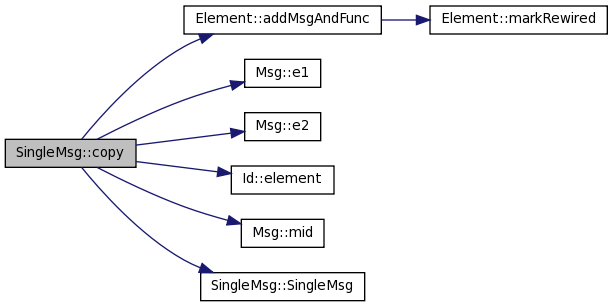
Find the other end of this Msg. In most cases this is a straightforward return of e1 or e2, plus perhaps a DataId. But in some complex msgs we need to figure out DataIds that match with the target. In many-to-one cases we just return the first entry. If no Element match, return ObjId( Id(), DataId::bad() ) If Element e matches but not DataId, return ObjId( e.id(), DataId::bad() )
Implements Msg.
References BADINDEX, ObjId::dataIndex, Msg::e1(), Msg::e2(), and ObjId::element().
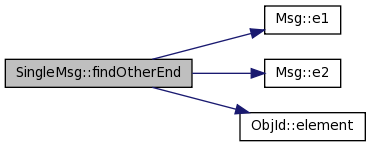
| DataId SingleMsg::getI1 | ( | ) | const |
Referenced by initCinfo().
| DataId SingleMsg::getI2 | ( | ) | const |
Referenced by initCinfo().
| unsigned int SingleMsg::getTargetField | ( | ) | const |
| DataId SingleMsg::i1 | ( | ) | const |
| DataId SingleMsg::i2 | ( | ) | const |
| const Cinfo * SingleMsg::initCinfo | ( | ) | [static] |
Set up the Msg to be accessed like an Element Although the bare Msg class is never seen, we will use it as a base class and set up some common fields here.
Reimplemented from Msg.
References getI1(), getI2(), Msg::initCinfo(), setI1(), and setI2().
Referenced by Msg::initMsgManagers().
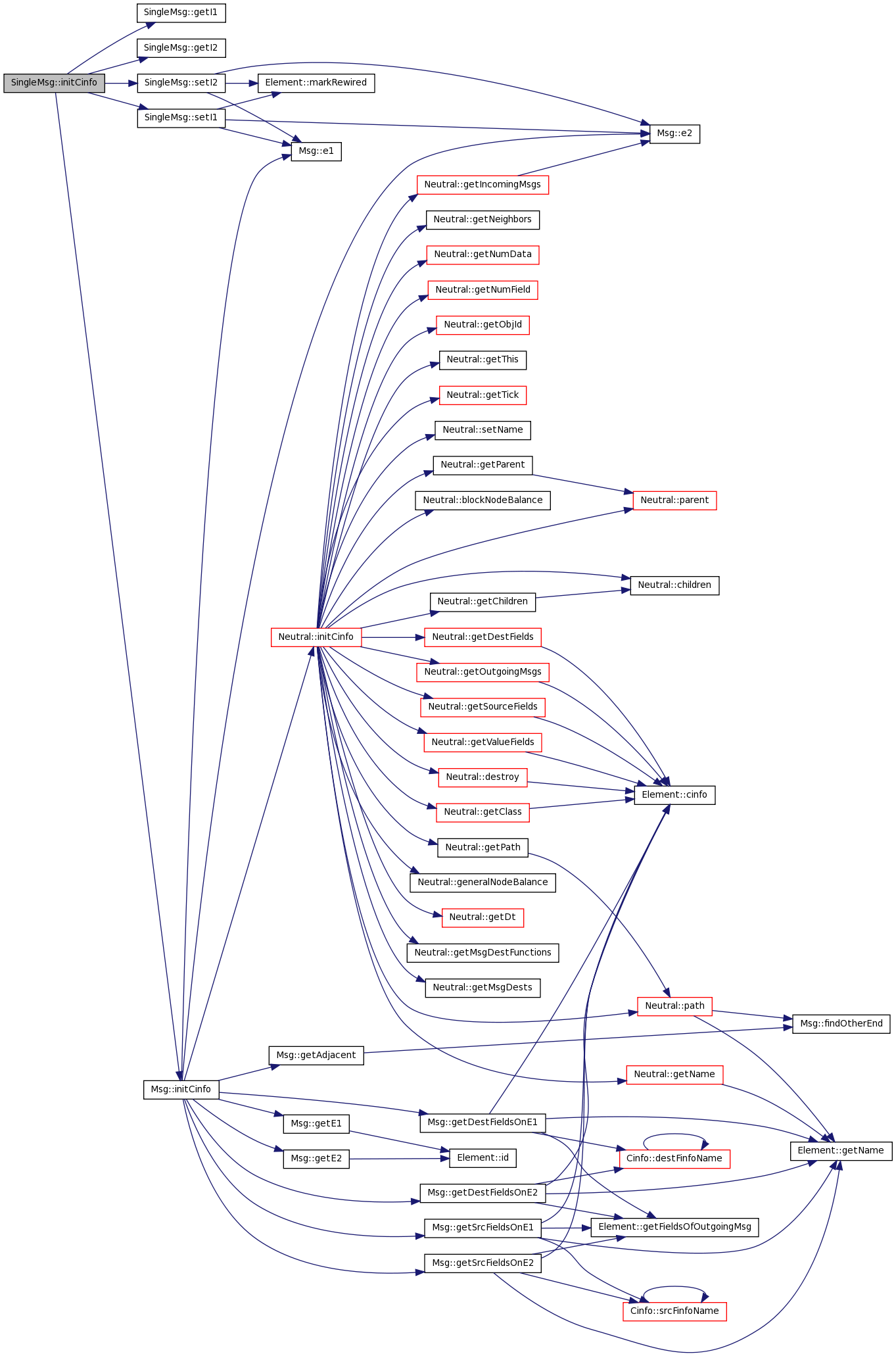
| char * SingleMsg::lookupMsg | ( | unsigned int | index | ) | [static] |
Static function for Msg access.
Referenced by Msg::clearAllMsgs(), and Msg::initMsgManagers().
| Id SingleMsg::managerId | ( | ) | const |
| unsigned int SingleMsg::numMsg | ( | ) | [static] |
Msg lookup functions.
Static function for Msg access.
Referenced by Msg::clearAllMsgs(), and Msg::initMsgManagers().
| void SingleMsg::setI1 | ( | DataId | di | ) |
References Msg::e1(), Msg::e2(), and Element::markRewired().
Referenced by initCinfo().
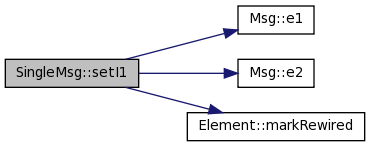
| void SingleMsg::setI2 | ( | DataId | di | ) |
References Msg::e1(), Msg::e2(), and Element::markRewired().
Referenced by initCinfo().
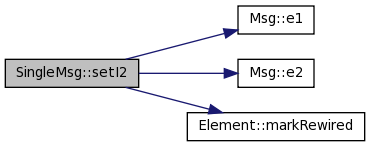
| void SingleMsg::setTargetField | ( | unsigned int | f | ) |
| void SingleMsg::sources | ( | vector< vector< Eref > > & | v | ) | const [virtual] |
Return all the sources of e2 from e1, that is, all the msgs coming into specified entries on e2 from e1.
ALLDATA used when the sources include all data entries on a source. Indexing is v[dataId in range e2.numData][src list]
Implements Msg.
| void SingleMsg::targets | ( | vector< vector< Eref > > & | v | ) | const [virtual] |
Return all the targets of e1 on e2, that is, all the msgs going from specified entries on e1 to e2. ALLDATA used when the targets include all data entries on a target. Indexing is v[dataId in range e1.numData][tgt list]
Implements Msg.
Friends And Related Function Documentation
| unsigned int Msg::initMsgManagers | ( | ) | [friend] |
The documentation for this class was generated from the following files:
- msg/SingleMsg.h
- msg/SingleMsg.cpp


 1.6.1
1.6.1